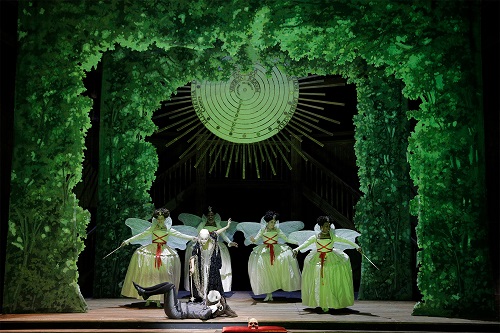 United States Donizetti, Roberto Devereux: LA Opera Chorus and Orchestra / Eun Sun Kim (conductor. Dorothy Chandler Pavilion, Los Angeles, 5.3.2020. (DD)
United States Donizetti, Roberto Devereux: LA Opera Chorus and Orchestra / Eun Sun Kim (conductor. Dorothy Chandler Pavilion, Los Angeles, 5.3.2020. (DD)

Production:
Director – Stephen Lawless
Sets – Benoît Dugardyn
Costumes – Ingeborg Bernerth
Lighting – Christopher Akerlind
Chorus director – Grant Gershon
Choreography – Nicola Bowie
Cast:
Queen Elizabeth I – Angela Meade
Robert Devereux, Earl of Essex – Ramón Vargas
Sara, Duchess of Nottingham – Ashley Dixon
Duke of Nottingham – Quinn Kelsey
Lord Cecil – Anthony Ciaramitaro
Sir Walter Raleigh – Michael J. Hawk
With a plot as twisted as its characters, Donizetti’s Roberto Devereux, one of his four operas about Tudor England, arrived in all its pomp and horror at the Dorothy Chandler Pavilion. It is an emotional tragedy, based – loosely – on the true story of Queen Elizabeth I and the Second Earl of Essex, Roberto Devereux. It is also Donizetti’s fifty-seventh opera (he wrote some seventy of them), and his reliance on the formal structure of the era shows. While the historical accuracy of Roberto Devereux may be shaky, this performance by a top-tier group of singers, supported by the LA Opera Orchestra under Eun Sun Kim, was probing in its psychological dissections and romantic implications, and beautiful to hear and to watch.
The inner tension of the opera was dramatically increased by its setting in this production from the Canadian Opera Company: a prototype of the Globe Theatre, where almost all of the action takes place. While some may have found the play-within-a-play (or stage-within-a-stage) to be a forced conceit, the trope worked well here. It narrowed the dramatic focus and intensified the most passionate scenes.
The plot concerns the tragic love triangle formed by Queen Elizabeth I, Roberto Devereux and poor Sara, the Duchess of Nottingham. The convolutions are multitude, and the conclusion is foregone (it is based on actual history, after all), but along the way there are a series of terrific solos, duets and the occasional trio. Among the many highlights were Ashley Dixon’s story of the Fair Rosamund, ‘All’ afflitto è dolce il pianto’, and Angela Meade’s rendition of Elizabeth’s famous cavatina, ‘L’amor suo me fe’ beata’.
Ramón Vargas, who sang the role of Devereux, seemed made for the part. He couples the bravura of a heldentenor (even when not with the appropriate composer) with vocal weightiness and sonority. Angela Meade conferred the dignity due to the role of Elizabeth, but also imbued the part with a queenly imperiousness. In a sense, Elizabeth seems to fall victim to her own faults. This was especially evident in the final act in what is one of the opera’s most difficult and demanding arias, ‘Quel sangue versato’.
The orchestra under Eun Sun Kim was faultless. They have long been noted for their virtuosity and polish, and it was certainly on display here. Conductor Kim, on her way north to a permanent appointment in San Francisco as the next music director of the San Francisco Opera, will always be welcome in Los Angeles. The members of the LA Opera Chorus under the direction of Grant Gershon were characteristically superb.
One final note: Donizetti’s overture includes an arresting if somewhat anachronistic reference to the music of the British national anthem, ‘God Save the Queen’, though American audiences may more easily recognize it as ‘America (My Country, Tis of Thee)’. This writer has heard variants of the tune as both athletic fight song and pub drinking song. It amazes and cheers me how a melody like this could have such wide usage.
Douglas Dutton